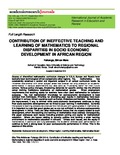Contribution of ineffective teaching and learning of Mathematics to regional Disparities in socio economic development in African region
Abstract
Causes of diversified mathematics curriculum changes in U.S.A, Europe and Russia have
basically been technological driven compared to other regions.
Yet
,
mathematics
has
consistently remained a central and important subject in al
l school curriculu
m levels.
Its
immense relationship with other subject areas has created not only pressure on students’
performance in various examinations but also acts as “frustrating belts” for their future
careers. Various policy changes, threatening
demands for specific entries into the different
career training institutions emphasize on mathematical grades. Direct employment
requirements and teaching styles for teachers have often used mathematics for selection
purposes. Yet, real mathematical kno
wledge for socioeconomic development is least
solicited from individuals. Priorities for alleviating poor results in mathematics have been
identified in various African countries such as Kenya, Zimbabwe and Namibia. Nevertheless,
the improvement, if any,
is minimal while socio
-
economic development
continues to drop.
Poor
socio
-
economic development can be linked to poor learning in mathematics. Currently
the subject’s learning procedures produce few individuals with good grades in mathematics.
It is impor
tant to note that good grades per se are not sufficient to enhance socioeconomic
development in Africa. There are other mathematical issues that are closely related to such
development, which the teaching and learning of mathematics must address. Consequen
tly,
this paper addresses such issues including problem solving and equity for mathematical
education. Others are issues relating to poverty, politics and forming a wider learning environment for mathematics education in schools. Unless such issues, andthe equity in mathematics in particular are fully addressed, the students’ endless poor performance will continue to form a strong base for poor socioeconomic performance in Africa. This is the essence of this article.
Collections
- School of Education [64]

